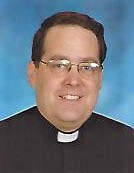- Clergy Corner
Contraception and Confession
by Fr. Michael Moore
Fall 2022
Certainly one of the most dramatic moments in the lives of the apostles came on Easter Sunday evening. They had spent three years with our Lord in his ministry. They then experienced the tumult in Jerusalem that ended with Jesus’ death. On Sunday morning they heard rumors of Jesus’ resurrection. Peter and John told them that the tomb that held Jesus’ body was empty.Now Peter tells them that Jesus, risen from the dead, appeared to him. So they gather.
Then it happens. Jesus, despite the locked doors, is suddenly with them.
The first thing he says to them is:
“Peace be with you.
As the Father has sent me,
so I send you.”
Then he breathes on them and says:
“Receive the Holy Spirit.
Whose sins you forgive
are forgiven them;
whose sins you retain
are retained.”
Catholics believe that Jesus is giving them the authority to forgive sins in confession. But why did he do this?
I have to believe he did it because he expected people to come to the apostles for forgiveness of sins. In the Old Testament the Israelites would come to the Levite priests with certain animal sacrifices as sin offerings after they committed sin. People confessed their sins to John the Baptist before receiving baptism at his hands. Now people are to come to the apostles and their successors for forgiveness. Why? Certainly because people need not only forgiveness but guidance.
Most of us have a tendency to justify particular sins we feel drawn to, and we need guidance– and sometimes correction– from spiritual leaders.
Brothers in the priesthood, we are called to provide that guidance — and sometimes correction. I know that for me, the thought of hearing confessions was what made me most nervous as I approached ordination. I had had plenty of practice preaching and felt I could craft fairly good homilies for different occasions. I knew the rubrics of the Mass and other sacraments and felt joy at the thought of giving people the sacraments. But confession?
Shortly before ordination a classmate and I were talking with a medical student nearing graduation. She expressed anxiety at the thought of receiving patients and having to diagnose them on her own. We told her we felt the same about confession.
We all experience confessions of devotion, in which people confess light sins, not seeking profound advice, but wanting the ongoing grace of the sacrament. We know we do not have to spend a lot of time counseling these penitents. We also hear confessions of sins of passion or addiction. We give absolution, but if the person comes back repeatedly we consider guiding him to a 12-step program or anti-pornography ministry.
I would submit to you that sins of contraception represent a third category. They are not sins of passion, as they involve calculation. Nor are they light sins. Penitents confessing ongoing contraception need to be challenged to change or not receive absolution.
Does this make us guilty of the criticism our Savior directed at the scribes and Pharisees:
“They tie up heavy burdens and lay them on people’s shoulders, but they will not lift a finger to move them”?
I would say no, for two reasons.
First, we dedicate ourselves to a celibate life of service to the people. We give, hopefully, a good example of men who live celibacy for the kingdom. In this way we show that the virtue of chastity is possible.
Second, we offer people the benefits of Natural Family Planning. We strive to accompany our parishioners spiritually and offer them instruction in which they can keep God’s law in their state in life.
Thank you CANFP for providing encouragement and training for couples to instruct others in NFP. You are filling one of the paramount spiritual needs of our society. It is a real pleasure for me to be able to refer people to teaching couples in any area in California, in English or Spanish.
May God bless you to persevere in your great work, and may God guide and bless all priests as we strive to work for the kingdom Jesus established.
About The Author


